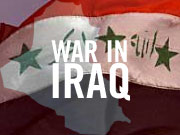Photos
More from MPR
Your Voice
| ||||||||||||||||||||||||
MPR Poll: Minnesota voters divided about Iraq
July 20, 2004
A new poll shows Minnesotans continue to be divided about the war in Iraq and its aftermath. The Minnesota Public Radio-St. Paul Pioneer Press poll finds no overwhelming consensus on whether the U.S. intervention will make things better in Iraq, and whether it will improve the United States' standing in the world.
St. Paul, Minn. — The poll of 625 registered Minnesota voters finds about one-third supported the decision to go to war, and think the Bush administration is doing the right thing in rebuilding the country. Another third say the Bush administration was right to fight the war, but didn't adequately prepare for the aftermath. And yet another third say the U.S. shouldn't have gone to war in Iraq. Brad Coker of Mason-Dixon Polling and Research said the war has divided Minnesotans since it began.
"Very little has changed over time. Most people who were against the war at the outset -- their views have hardened. And people who supported the war generally still support it," Coker said. "Maybe there are some issues where they've softened up a little bit, but not to the extent that they feel that the whole thing was a total wasted effort."
Almost half of poll respondents think the U.S. intervention will ultimately improve the situation in Iraq. One-third think there will be no real change for most Iraqis, and 11 percent say the U.S. intervention will make things worse. Those numbers are similar to the findings of the last MPR-Pioneer Press poll in May.
|
Very little has changed over time. Most people who were against the war at the outset -- their views have hardened. And people who supported the war generally still support it.
- Pollster Brad Coker |
Poll respondent Dennis Proell agreed with the decision to go to war, although he said the administration could have planned better for post-war Iraq. Proell is a corrections guard who lives in Madison in western Minnesota. He said he thinks the U.S. intervention will eventually make things better for Iraqis.
"It's hard to say -- I think they're probably about the same as they were, but I think it'll get better for them," Proell said.
Proell said he doesn't think the intervention had much effect on the United States' standing in the world. Poll respondent Nancy Gruetzmacher disagreed. Gruetzmacher, who owns a small business in Duluth, said the U.S. decision to go to war gave the country a black eye to the rest of the world.
"That's actually the saddest part, because I think we're doing some good for those people and the rotten leader that they had. But it just made us look so bad to the rest of the world," Gruetzmacher said. "Then, when ... they haven't found the weapons of mass destruction, that made us look even worse."
The poll found that slightly more than one-third of those polled think the intervention will worsen the United States' standing in the world. That's down from half in the May poll. Another one-third said the U.S. standing won't change, while 21 percent said it will get better. More than half of respondents think world opinion of the United States hasn't changed since the U.S. turned over sovereignty to Iraq leaders at the end of June.
The one thing Minnesota voters do appear to agree on is the fate of former Iraq president Saddam Hussein. Pollster Brad Coker said the overwhelming majority of respondents believe the United States was right to turn over Saddam Hussein to the Iraqis for trial.
"I think both sides -- Democrats, Republicans, anti-war, pro-war people -- would say the quicker the Iraqis can take control of their country and be responsible for their own affairs, the better," Coker said. "And with Saddam Hussein ... both sides might actually agree that this might be the one thing that could bring Iraqis together and get them to step up and take control of their affairs."
The poll found no consensus on when it's reasonable to expect U.S. troops to leave Iraq. The answers varied on a timeframe, although about half thought they should leave sometime between now and the end of 2005.
While Minnesotans are divided on many issues surrounding Iraq, the war and its aftermath could play a significant role in the presidential race. The poll found the situation in Iraq is the second most important issue in the race, behind the economy.
More than half of respondents thought Republican President George W. Bush would do a better job of handling Iraq, followed by the 39 percent who thought Democrat John Kerry would do a better job on that issue. The poll's margin of sampling error is plus or minus four percentage points.
|
News Headlines
|
Related Subjects
|


